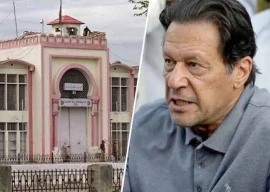"I want to be the greatest scientist in the world," proclaimed finalist Syed Shahzeb Zarrar.
"When you're surrounded by so much talent, and thousands of innovations, it’s hard not to believe it could happen for any one of the students at Isef."
Zarrar, along with two other finalists, arrived in Pittsburgh last week. Five finalists were named in Pakistan, but only three obtained a visa.
Finalists received an all expenses paid trip to the Intel Isef conference. It was Zarrar’s first trip to the US, and he said he enjoyed the city of Pittsburgh because it was peaceful and not very large or crowded.
“Every Pakistani should know about Isef. Everyone has a hidden talent. Because of Isef, I was able to discover mine,” said the finalist.
It took him approximately eight months to complete his project. It is titled ‘Production of Artificial Magnetic Domains in Non-Metals’. He explained that electricity could be produced cheaply if non metals were employed. He added that his project was cost efficient and could easily be used in Pakistan. Zarrar attends Iqra Army Public School and College in Quetta.
“I’ve made friends from India, Japan, and even New Mexico thanks to this conference. It is amazing.”
Asked about entertainment provided for students prior to the judging and ceremonies, he smiled and said, “At one of the events, they were giving us free fast food! When does that ever happen back home?”
Energy square idea
A team of three girls were also named finalists in the competition, but only two made it stateside. Mahnoor Hassan, Shiza Ghulab and Bushra Shahed from the Institute of Computer and Management Sciences in Peshawar had a project titled 'Energy Square for Cattle'. Hassan and Ghulab were present to describe their experiences. Their goal, Hassan put it, was to provide something for animals when faced with unfavourable conditions or natural disasters.
“People think of themselves in times of disaster before animals,” said Ghulab. She provided the example of recent floods in Pakistan. “This square makes it easier to look out for the well-being of livestock also,” she added.
The girls said that just a few licks of their energy square controlled diseases, increased milk production and increased weight in the cattle they conducted tests on after just 28 days.
They provided signed documents, pictorial evidence, and test results to anyone who wanted more information.
The squares are a dry mix of a variety of ingredients, such as mulberry, urea and calcium, that provide vitamins and protein to your animal. Hassan said the squares were ideal because they had no expiration date.
“Since people who have animals are usually poor, we have created an affordable option for them,” said Ghulab.
Both girls were on their first trip to the US and said they enjoyed the conference because of the people around them. “People here are nice, they all have smiling faces,” said Ghulab.
Another finalist who missed the event was Musa Rahim Khan of Agha Khan Higher Secondary School in Chitral, whose project was titled ‘Water and Heat Detector’. At the convention centre, an empty place next to Zarrar signified the missing project.
“We support the Intel International Science and Engineering Fair because we know that math and science are imperative to future global growth,” said Wendy Hawkins, executive director of the Intel Foundation.
“This competition encourages millions of students to engage their skills for innovation and develop promising solutions for global challenges.”
COMMENTS (2)
Comments are moderated and generally will be posted if they are on-topic and not abusive.
For more information, please see our Comments FAQ




1725030039-0/Untitled-design-(2)1725030039-0-165x106.webp)


1732622842-0/Express-Tribune-(9)1732622842-0-270x192.webp)









With half the population below 20 years and 60 per cent below 30 years, Pakistan is well-positioned to reap what is often described as "demographic dividend", with its workforce growing at a faster rate than total population. This trend is estimated to accelerate over several decades. Contrary to the oft-repeated talk of doom and gloom, average Pakistanis are now taking education more seriously than ever. Youth literacy is about 70% and growing, and young people are spending more time in schools and colleges to graduate at higher rates than their Indian counterparts in 15+ age group, according to a report on educational achievement by Harvard University researchers Robert Barro and Jong-Wha Lee.
http://www.riazhaq.com/2011/10/pakistans-expected-demographic-dividend.html
and two students were denied their visa!! to attend a fully funded (Intel) conference, and there was an article in ET a few months ago about "US visa rejection a myth"...deterring Pakistani students to come to the US for studies!! On the bright side 3 did GET their visa. Good jobs guys, by the way.